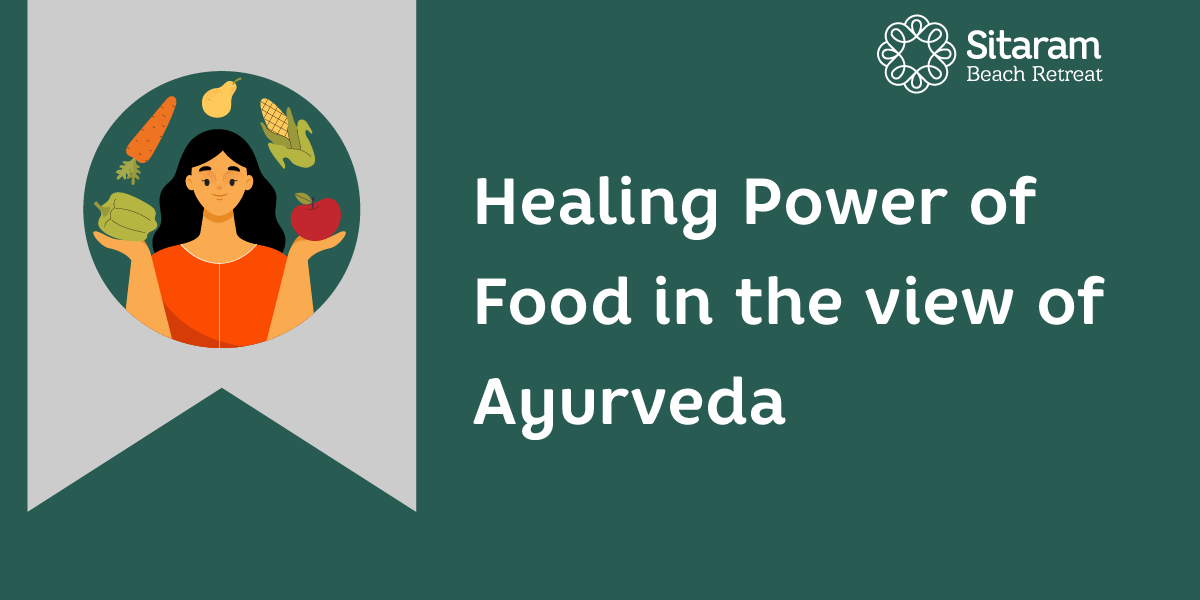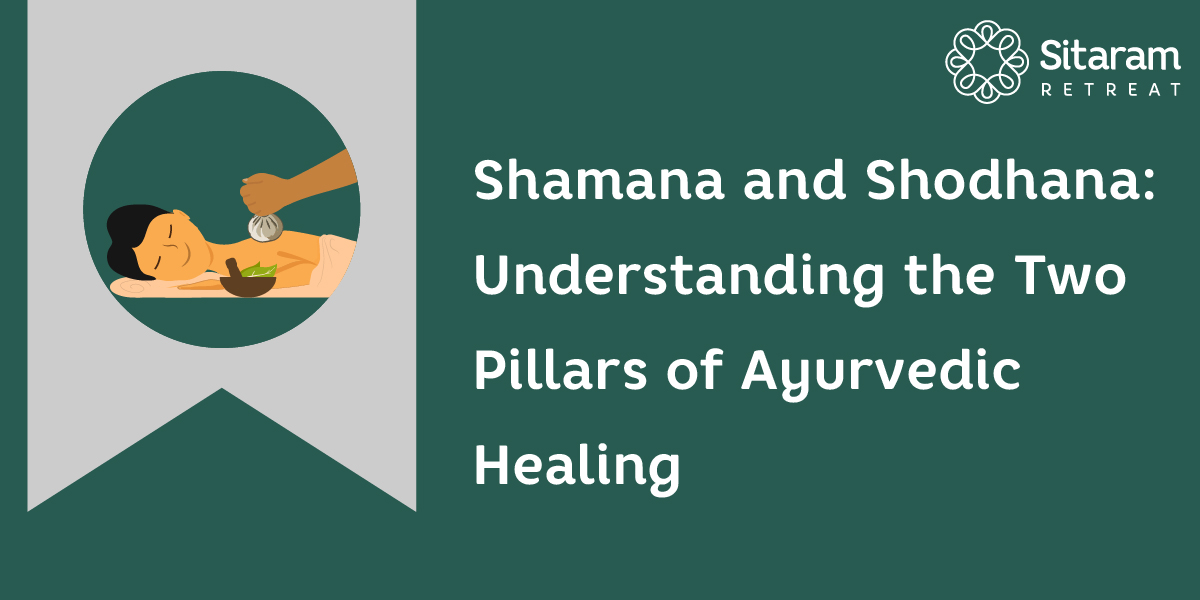Importance Of Healthy Food And Its Healing Power
By Vignesh Devraj

In Ayurveda, food refers to as “Mahabheshajam” (The Great Medicine). A well-balanced diet is the cornerstone of both mental and body health, strength, and happiness.
Two-thirds of a well-balanced diet should be nourishing foods that assist in the development of tissues, and one-third should be purifying foods that prevent Kapha build-up and excess tissue build-up. Grains, fruits, milk, dairy products, nuts, lipids, and starchy vegetables like potatoes are all nourishing foods to include in our diet. Purifying foods include pulses and all rajasic or tamasic veggies.
Shad Rasas – The six tastes mentioned in Classics
Ayurveda has enumerated six tastes and their qualities. Every substance we consume has one or two predominant flavors out of the six tastes. They are madhura (sweet), amla (sour), lavana (salty), tikta (pungent), katu (bitter), and kashaya (astringent). These six flavors also correspond to the six stages of the digestive process.
Each taste plays a significant role in stimulating the digestive system. The six flavors are perceived at different anatomical locations of the tongue and correspond to various digestive organs. For example, the tongue’s tip detects sweetness and links to the corresponding organs, thyroid glands, and apical areas of the lungs. Pungent affects the stomach and head, whereas bitter affects the pancreas, liver, and spleen, astringent affects the colon, sour affects the lungs, and salt affects the kidneys.
Importance of Balanced diet
According to Ayurveda, optimal health is “being established in one’s own or own natural state.” To do so, one must establish a level of self-awareness and contentment and a balance in all the physiological activities that take place in the body and mind. Ayurveda believes that the food we consume, to be precise the plants, plant products, and animal products, have a strong influence on the physical and mental states of the individual. Therefore, the science explains the importance of eating healthy food; also suggests avoiding too many raw foods and leftovers.
Several studies conclude the influence of food over the mind and emotions. Ayurveda asserts the reason being the quality of food eaten, mode of preparation, appearance, aroma, and freshness. These elements have a profound impact on all the five senses and regulate proper digestion.
Diet in Ayurveda has been categorized into three types, namely – Satvic, Rajasic, and Tamasic.
Satvic foods refer to light food with high prana (energy). Eating healthy food enables easy digestion, balances all three doshas, supports the immune response, brings mental harmony, and evokes conscious awareness. These include fresh vegetables, rice, milk, butter, honey, fruits, nuts when eaten correctly.
Rajasic food included garlic, coffee, fermented drinks, fried food, too spicy or hot food items. These tend to stimulate restlessness, jealousy, and ego in the body. But, on the other hand, rajasic food is also responsible for creativity and aggression. So, be mindful about including the Rajasic diet in your daily consumption.
The word Tamas correlates to dull and sluggish patterns. The food list contains frozen food, certain root vegetables, highly refined sugar substances, non-vegetarian diets, leftover, and stale food. Such food items, when consumed regularly, may impact the digestive mechanism as they may need more energy to process them. Apart from that, it also may lead to ignorance, greed, laziness, and confusion.
A little spice in your diet can ignite digestion –
Herbs and spices play an essential role in our day-to-day nutrition as it enhances the hormonal balance in the body. For example, regular use of ginger neutralizes the heavy quality of food and makes it easier to digest. On similar grounds, when combined with different other foods, it will change its mode of action. For instance, ginger in combination with rock salt will reduce Vata dosha symptoms, whereas, with rock candy, it reduces pitta, and when taken with honey, it pacifies Kapha. Ginger treats indigestion, colic, flatulence, upset stomach, chronic cough, and cold due to its versatile quality. Herbs also enhance the taste and flavor of the foods.
Here we are enlisting a few herbs and spices that are used regularly in our kitchen –
| Name of the spice | Taste | Properties |
| Jeeraka (Jeera) | Bitter-pungent-astringent | Promotes digestion, relieves diarrhea |
| Haridra (Turmeric) | Bitter-pungent-astringent | Anti-inflammatory prevents bacterial and viral infections, enhances digestion |
| Ardraka (Ginger) | Pungent-sweet | Stimulant, carminative, decongestant, nervine, analgesic, anti-emetic |
| Maricha (Black pipper) | Pungent-hot | Digests fat, expectorant, improve digestion |
| Dhanyaka (Coriander) | Sweet-astringent | Balance the pitta |
Importance of healthy eating habits
When we consider healthy eating, there are different entities to look upon. However, all the factors together lead to a healthy body and mind.
- Quality of Food – The quality of food we eat is a fundamental matter of concern. Eating too little or more doesn’t fulfill the purpose. Ayurveda recommends filling the stomach half with solids, one quarter with liquids, and leaving one quarter empty.
- Timing – The time of the day and season play a huge role in determining the best food to eat. In the summer season, our metabolism will be at its peak, and in winter, we need to consume rich and nourishing food.
- Origin – Choose regional and healthy foods of your area than imported foods.
- Combination – Do not include incompatible foods in your diets. A typical example to mention is curd and fish. Buffets also can lead us to an inconsistent way of eating, as it has different cuisines with variable properties and potency.
- Preparation – Healthy foods are a result of thoughtful preparations. Naturally grown foods help in easy digestion and fast absorption.
- Place you eat – The surrounding you cook and eat play a crucial role in determining your health. In addition, healthy eating habits promote a good state of mind and alertness.
- The person who eats is most important. Consider the food as nectar; even the healthiest food can become poison if you consume it in a hurry or if your metabolism slows down.
At Sitaram Beach Retreat, we follow plant-based healthy eating patterns. We educate our clients about the importance of food and nutrition and encourage mindful eating. Our kitchen depends mostly on organic ingredients and we follow the concept of farm-to-table as fresh as possible. The food that is growing is good to eat more than the packaged ones. We also have a special diet while undergoing panchakarma and ayurvedic treatment. The food we consume has to be lighter and easily digestible.
To sum up, a healthy diet is a golden key to keeping you healthy, energetic, alert, and disease-free. Each of these ancient Ayurvedic rules will help you stay healthy not just because of what you eat but also because of how you eat it. Also, remember to savor your meals and be grateful.
*********


 retreat@sitaramayurveda.com
retreat@sitaramayurveda.com +91 813 8888 912
+91 813 8888 912





